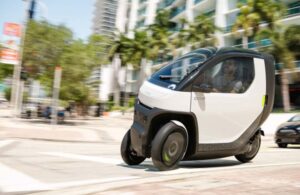Nimbus has launched a prototype for its Nimbus One, a tiny, three-wheeled EV that combines the convenience and cost of a motorbike with the safety and comfort of a car.
 The thin, pod-like vehicle is only about 2.75 feet wide and 7.5 feet long, which Nimbus says makes it three to five times smaller than a compact car — the better to park and navigate busy urban streets.
The thin, pod-like vehicle is only about 2.75 feet wide and 7.5 feet long, which Nimbus says makes it three to five times smaller than a compact car — the better to park and navigate busy urban streets.
“As the cost of living in cities becomes untenable for young people and as they increasingly adopt sustainable energy, Nimbus will provide them with the perfect blend of both: an affordable, lightweight, convenient electric vehicle that serves their basic needs,” Jesse Michels, an investor at Thiel Capital. “From a market perspective, it’s the only EV company with 35% margins that should improve with scale. It has the safety profile of a car with the fun and agility of a motorcycle. Longterm, Nimbus should revolutionize urban mobility and do what Tesla is doing up-market, for younger people and urbanites.”
The EV prototype vehicle also tilts, like a motorbike or scooter would, due to Nimbus’s proprietary tilting technology.
Since the Nimbus is made for city driving, not highway driving, it has a top speed of 50 miles per hour. Its 9 kWh battery has a range of 93 miles and a charge time of 1.2 hours on a Level 2 charger or 5.4 hours on household power, according to the company.
Taking a page out of Gogoro’s book, Nimbus’s batteries are removable, swappable and can be charged in the owner’s own home.
The Nimbus One’s minimalist interior includes a display screen, Bluetooth-connected speakers, power windows, a rapid phone charger, heating and optional air conditioning. The vehicle also has a front collision warning and additional features can be sent to the vehicle with over-the-air updates, according to the company.
Nimbus expects first deliveries from impending pre-orders to come in the third quarter of 2023, but the company hasn’t yet chosen its launch city.
The startup is also in talks with several shared micro-mobility operators, other vehicle sharing programs and food and grocery delivery companies.
All vehicle functions, like door locks, power windows, speakers and even steering, braking and vehicle speed can be controlled via Nimbus’s central control unit and accessed via API, making the vehicles highly compatible for a vehicle-sharing program.
In addition, up to four 2.2 kWh swappable battery packs can be equipped with the vehicle, a feature that has the potential to cut overhead costs associated with charging shared fleet vehicles.
Of course, manufacturing costs for any vehicle have never been higher than they are today, so Nimbus will need to raise another round to make it to production. The startup wants to raise $20 million in equity and $10 million in debt for its Series A, as well as bring on a customer who is also a strategic investor.

